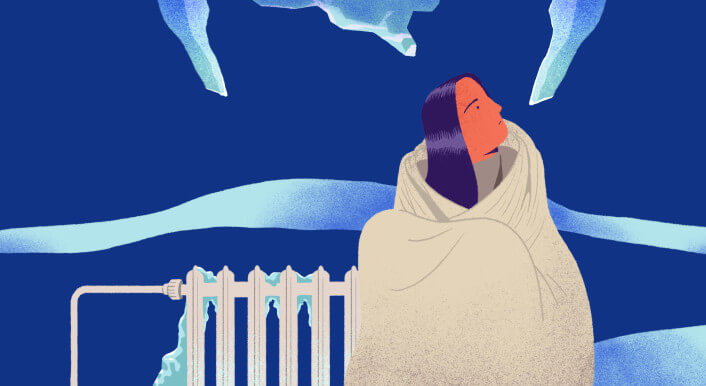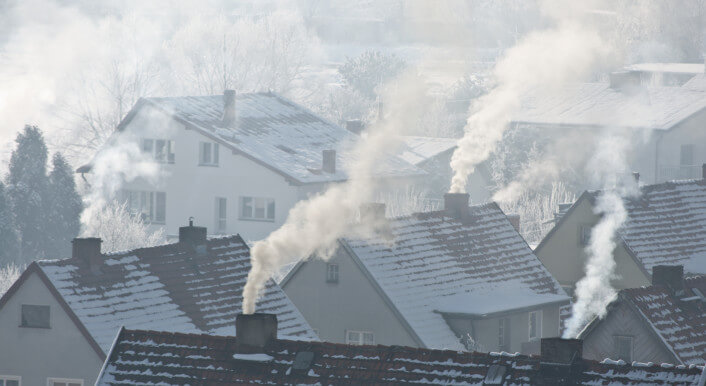“It’s difficult to explain that you freeze to death at 5 degrees Celsius”
An estimated 47 Million people in Europe cannot afford a warm home in winter, according to a calculation from CORRECTIV.Europe. Reports from local journalists in our network show the dimension of the problem in several countries.

Winter in Europe is showing its frosty face: Temperatures hit -12 degrees Celsius in Prague and -10 in Berlin. They also dropped in southern countries down to -1 in Paris and 3 in Madrid. Now imagine making your way home through the cold and being unable to warm up upon arrival because your radiator is cold – along with the rest of your home.
According to our latest analysis, this is the reality for around 47 Million people in Europe. And it poses a serious health risk: People in cold and damp homes have an increased risk not only of mental illness but also cardiovascular disease – such as heart attacks – and chronic respiratory infections. Together with our network partners, local journalists across Europe, we highlight the enormous number of people affected. Our network has published 15 articles on the topic. You can learn more about the situation on the ground by reading their work here.
The latest available data by Eurostat shows that in 2023, almost 2.2 million people in Portugal lived in cold homes during winter. The country is also home to Europe’s second most affected region: The Azores, where 34.3 per cent of the population lacks thermal comfort. Público Azul talked to Ana Monteiro, a professor in the Department of Health about the issue.
“It’s often difficult to explain that you freeze to death in Portugal at 5 degrees Celsius because, in the scientific literature, cold-related mortality is at minus 20 to 30 degrees Celsius,” Monteiro told Azul. “However, we have already demonstrated an increase in mortality (and morbidity) in the Porto metropolitan area with temperatures still above zero.” Monteiro is the co-author of a scientific study published recently in the journal Nature Medicine, which estimates that, although winters in Europe may be getting milder due to the climate crisis, cold-related deaths in Portugal will continue to be very present in the climate scenarios projected until the end of the century.
Some 47 million people throughout the EU, Switzerland and Norway could not heat their homes sufficiently last winter, corresponding to 10.2 per cent of the population. That's an increase of more than 50 per cent from 2021. People are particularly affected not in Northern Europe, but rather in southern regions: Spain, Greece, Portugal, Bulgaria, and Italy. Lithuania also stands out.
In the Spanish region of Catalonia, a growing number of people are grappling with energy poverty, a situation that deprives them of access to essential services such as electricity, heating, and running water, as reported by the Catalan newspaper diari ara reports. Roughly 1.57 Million people are unable to afford adequate heating, more than 20 per cent of the population. The lack of these essential services not only impacts the quality of life, but also leads to additional expenses and compromises fundamental rights. The contrast between the two realities in the same city – and even in the same building – is striking, according to diari ara. An affected woman told them: “While a large part of the population enjoys a comfortable Christmas at home, with the heating on and refreshing hot showers, another significant part of the population suffers the consequences of energy poverty in silence.” The woman has neither electricity nor running water in her home.
The lack of these essential services has direct consequences for personal hygiene. People who are affected are forced to strategize around basic needs. Some may need to go to the homes of trusted friends or relatives to take a hot shower.
Some organizations have stepped in to help mitigate the effects of energy poverty. Some people who spoke with diari ara said that they were able to get kits from the Red Cross which contained practical items such as LED bulbs, adhesive window insulation to prevent cold from seeping into their homes, alongside other materials tailored to their needs. While it is not a permanent solution, the kits provide both vital and immediate relief.
Northern France is also amongst the worst affected regions in Europe, mediacités reports. In the Nord and Pas-de-Calais departements, 15.1 per cent of the population was affected, resulting in 615,000 people unable to adequately heat their homes.
Matteo, a student in Lille, has been living in a shared flat since September. The apartment is rated E in terms of energy performance. He and his flatmate waited until November to turn on the heating, they told mediacités. “The flat was 12 degrees. We started to turn on the heating, but we realised that the bills were going through the roof.” The bill they received in January is proof of that: 340 euros for electricity in a single month.
Matteo keeps his home at just 16 or 17 degrees for just four hours a day. The rest of the time, he turns down the three heaters to 13 degrees “so that the flat doesn't fall to 10 degrees, as has already happened when we weren't heating.” To combat the cold, Matteo and his friend “tried wearing thick clothes, blocking off the windows, leaving the oven on after each cooking session.” To no avail. It is challenging to get out of bed in the morning, to go and have a shower, he told mediacités. “What's also difficult is the feeling of coming in from outside when you think you're going to warm up at home, but it's less than 15 degrees in your flat. You never find comfort.”
Pascaline bought a house near Lille in 2022. She lives alone with her two teenagers and told La Voix Du Nord that on a civil servant's salary of less than 2,000 Euros a month, she can't heat sufficiently: "I heat to 16.5 degrees in half the rooms in the house, the ones where we live. Elsewhere, the temperature drops to 12.5 degrees in the morning. This is the case in the bathroom. It is not pleasant." She says her strategy includes thick jumpers, candles, bubble wrap on the windows and thick curtains. And that the three are doing everything they can to claw back a few degrees. "We would have to do some insulation work, but I do not have the money," she told La Voix Du Nord.
All of these reports point to what experts say are the cause of the problem: high energy costs, low incomes and poorly insulated homes. These three factors are the main reasons for so-called energy poverty and need to be tackled by politicians across Europe urgently. So that fewer people freeze next winter.


